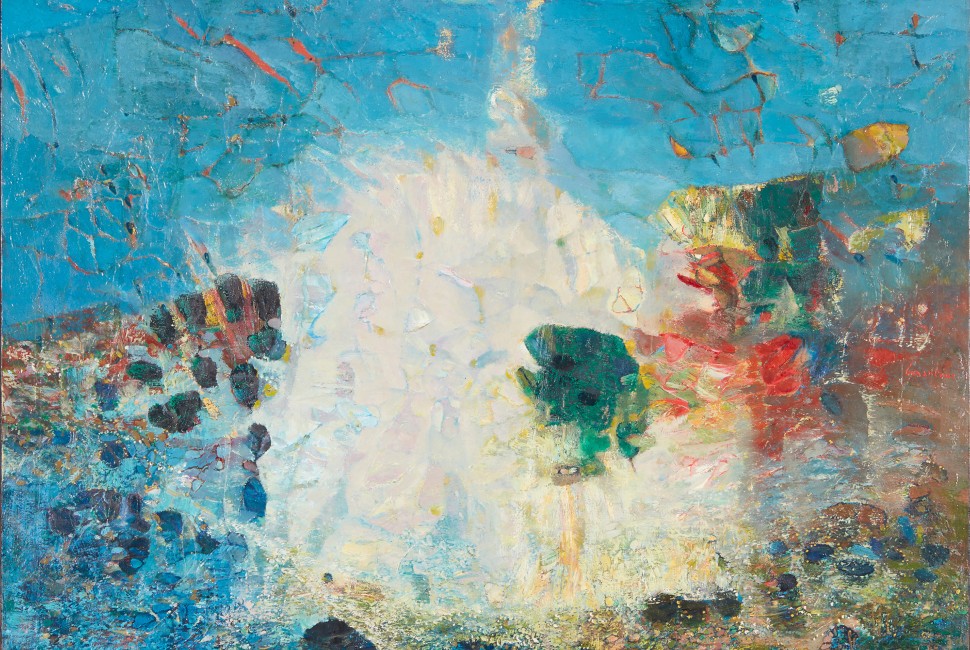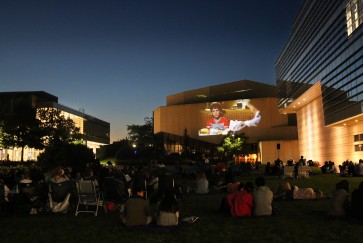The Block Museum of Art at Northwestern University will present “Taking Shape: Abstraction from the Arab World, 1950s –1980s,” Sept. 22 to Dec. 4, 2022. The exhibition features mid-20th-century abstract art from North Africa, West Asia and the Arab diaspora work from the renowned Barjeel Art Foundation collection. The Block Museum is the final stop of a five-city U.S. exhibition tour.
The 90 paintings, sculpture, drawings and prints in “Taking Shape” reflect the wide range of nonfigurative art practices that flourished in the Arab world over four decades and prompt an expansion of the abstract art canon and broadening of conversation to encompass a global view of modernism.
The exhibition highlights several abstract movements that developed in the region and shows how individual artists and collectives grappled with issues of authenticity, identity and the decolonialization of culture.
Exploring global modernisms
“‘Taking Shape’ is the newest chapter in The Block’s exploration of global modernisms, and the exhibition aligns with the museum’s commitment to focus on understudied, overlooked and even suppressed art histories,” said Lisa Corrin, Ellen Philip Katz Executive Director.
“These beautiful works capture the spirit of experimentation that made abstract art of the ’50s–’80s so exciting and that make it a touchstone for so many artists working today. We believe it is crucial that art museums continue to question how and by whom art history has been written in the past and to pursue opportunities to expand our understanding about art’s histories. Exhibitions like ‘Taking Shape’ are key to adding depth and broadening our perspective on the ways global visual arts, cultures and politics are intertwined and connect to our contemporary moment,” Corrin said.
“Taking Shape” investigates abstraction in the Arab world during a period marked by decolonization, the rise and fall of nationalism, socialism, rapid industrialization, wars and mass migrations, and the region’s oil boom. Rising opposition to Western political and military involvement drove many artists to adopt critical viewpoints of the West and strive to make art relevant to their own locales. New opportunities for international travel and the advent of circulating exhibitions sparked cultural-educational exchanges that exposed artists to multiple modernisms leading them to consider their roles within a global context.
This varied group of Arab, Amazigh, Armenian, Circassian, Jewish, Persian and Turkish descent artists moved away from figuration to mine the expressive capacities of line, color and texture.
Expanding abstraction’s vocabulary
Inspired by Arabian calligraphy, geometry and mathematics, Islamic decorative patterns and spiritual practices, they expanded abstraction’s vocabulary and complicated its origins.
“Though abstract, these diverse works reflect the larger cultural, intellectual and spiritual negotiations of the Arab world in the 20th century,” said exhibition curator Suheyla Takesh of the Barjeel Foundation. ‘Taking Shape’ illuminates these broad horizons, introducing visitors to the diverse schools and movements that developed within and across these nations in a time of heightened international dialogue and diaspora.”
Related: See a schedule of events and learn more about the exhibit at The Block Museum of Art.
The Block Museum of Art will be the final stop on the exhibition tour. “Taking Shape” debuted at the Grey Art Gallery at New York University Jan. 14 to April 4, 2020. Additional sites included the McMullen Museum of Art, Boston College from Feb. 1 to June 13, 2021; Tampa Museum of Art, Sept. 30, 2021, to Jan. 16, 2022; and Herbert F. Johnson Museum, Cornell University, Feb. 12 to June 12, 2022.
“This is really a reflection on how forward-thinking and progressive the institutions that are hosting the show are,” said Barjeel Art Foundation founder Sultan Sooud Al Qassemi in an interview with Hadara Magazine. “Also, it’s important to note that we only work with university museums in America for two reasons. The first is that these are medium-sized museums and they’re much more malleable than larger institutions, which need years to put together an exhibition. The other aspect is the educational aspect — every single one of these museums will have symposia, conferences and talks, and they have the students involved, which is really important.”


